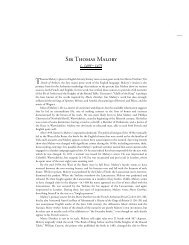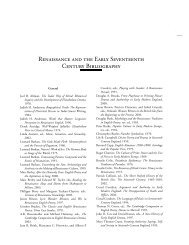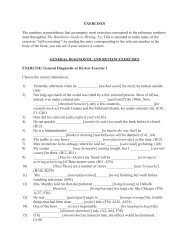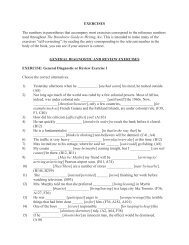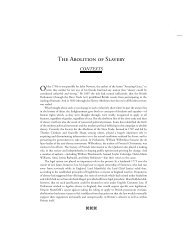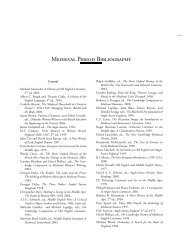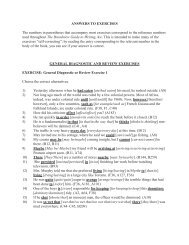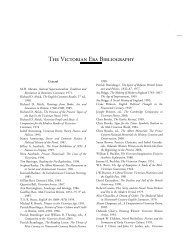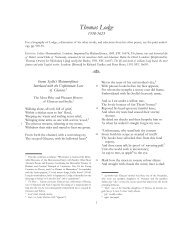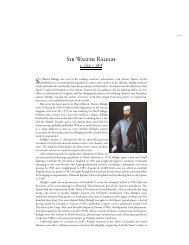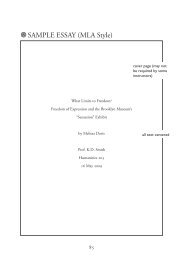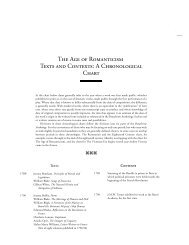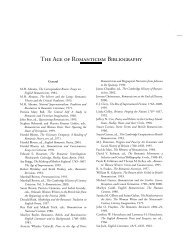A Chronological Chart - Broadview Press Publisher's Blog
A Chronological Chart - Broadview Press Publisher's Blog
A Chronological Chart - Broadview Press Publisher's Blog
You also want an ePaper? Increase the reach of your titles
YUMPU automatically turns print PDFs into web optimized ePapers that Google loves.
The Twentieth Century and Beyond<br />
Texts and Contexts: A <strong>Chronological</strong><br />
<strong>Chart</strong><br />
In the chart below, dates generally refer to the year when a work was first made public, whether<br />
published in print or, in the case of dramatic works, made public through the first performance of a<br />
play. Where that date is known to differ substantially from the date of composition, the difference<br />
is generally noted. With medieval works, where there is no equivalent to the “publication” of later<br />
eras, where texts often vary greatly from one manuscript copy to another, and where knowledge of<br />
date of original composition is usually imprecise, the date that appears is an estimate of the date of<br />
the work’s origin in the written form included or referenced in the <strong>Broadview</strong> Anthology. Earlier oral<br />
or written versions are of course in some cases real possibilities.<br />
Divisions in these chronological charts follow the divisions into six parts of the <strong>Broadview</strong><br />
Anthology. For the convenience of those who may be focusing on only one period, but who may wish<br />
to look slightly beyond its boundaries as they are generally defined, there is in some cases an overlap<br />
between periods in these chronologies. The Restoration and the Eighteenth Century chart, for<br />
example, carries through to the end of the eighteenth century (thereby overlapping with the chart for<br />
The Age of Romanticism), and the chart for The Victorian Era begins several years before Victoria<br />
came to the throne.<br />
Texts<br />
1899 Helen Bannerman, The Story of Little Black Sambo<br />
Joseph Conrad, Heart of Darkness<br />
Arthur Symons, The Symbolist Movement in<br />
Literature<br />
Oscar Wilde, The Importance of Being Earnest: A<br />
Trivial Comedy for Serious People<br />
Oscar Wilde, An Ideal Husband<br />
William Butler Yeats, The Wind Among the Reeds<br />
<br />
Contexts<br />
1899 Irish Literary Theatre founded<br />
Sigmund Freud publishes Die Traumdeutung<br />
(The Interpretation of Dreams)<br />
1899-1902 South African War (also known as the Anglo-<br />
Boer War): an influx of British settlers to the<br />
Transvaal following the discovery of gold in<br />
1885 had put pressure on relations between<br />
Britain and the independent republics of the<br />
Orange Free State and the Transvaal (South<br />
African Republic), both controlled by Dutchdescended<br />
Afrikaners. Tensions were<br />
exacerbated by the abortive 1896 Jameson raid<br />
(led by Starr Jameson of the Rhodesian police<br />
force), which was an attempt by the British to
2 The Twentieth Century and Beyond<br />
1900 Winston Churchill, London to Ladysmith via<br />
Pretoria<br />
Joseph Conrad, Lord Jim<br />
H.G. Wells, Love and Mr. Lewisham<br />
1901 Miles Franklin, My Brilliant Career<br />
Rudyard Kipling, Kim<br />
H.G. Wells, The First Men in the Moon<br />
1902 Joseph Conrad, Youth<br />
Arthur Conan Doyle, The Hound of the Baskervilles<br />
Rudyard Kipling, Just So Stories for Little Children<br />
Alice Meynell, Later Poems<br />
E(dith) Nesbit, Five Children and It<br />
Beatrix Potter, The Tales of Peter Rabbit<br />
Bernard Shaw, Mrs. Warren’s Profession (first<br />
private performance, Stage Society. Shaw<br />
completed the original version of the play in<br />
1892; it was first published [in Plays Pleasant<br />
and Unpleasant] in 1898, and first<br />
performed publicly [and subsequently<br />
banned] in New York, 1905. The Lord<br />
Chamberlain’s ban on its public<br />
performance in Britain was removed in<br />
1924)<br />
incite expatriate British workers in the Transvaal<br />
to rebel against the local government. In the war<br />
itself, the British suffered several embarrassing<br />
defeats (leading many in Britain to question the<br />
government’s colonial strategy) before finally<br />
overcoming the Afrikaner forces. The two<br />
republics were incorporated into the British<br />
Empire at war’s end, but in 1912 South Africa<br />
was granted largely autonomous status as a<br />
dominion<br />
1900 Boxer Rebellion: this uprising in northern China<br />
was led by the Righteous Harmony Society<br />
(nicknamed the Boxers by Westerners), who<br />
were protesting the degree to which citizens and<br />
companies from Britain and other Western<br />
countries were given favorable treatment by the<br />
Qing dynasty. For some months the foreign<br />
compound in Beijing was under siege, but by<br />
year’s end the rebellion had been suppressed<br />
(and numerous reprisals carried out)<br />
1901 Queen Victoria dies; Edward VII succeeds to<br />
the throne<br />
First wireless communication across the Atlantic<br />
Factory Act forbids the employment in factories<br />
or workshops of children under the age of 12<br />
Commonwealth of Australia formed
1903 Samuel Butler, The Way of All Flesh<br />
Joseph Conrad, Typhoon and Other Stories<br />
1904 J.M. Barrie, Peter Pan: The Boy Who Would Not<br />
Grow Up<br />
Aubrey Beardsley, Under the Hill (unexpurgated<br />
version published as The Story of Venus and<br />
Tannhauser in 1907)<br />
A.C. Bradley, Shakespearean Tragedy<br />
G.K. Chesterton, The Napoleon of Notting Hill<br />
Joseph Conrad, Nostromo: A Tale of the Seaboard<br />
Sara Jeannette Duncan, The Imperialist<br />
Thomas Hardy, The Dynasts: A Drama of the<br />
Napoleonic Wars (first part; third and final<br />
part published in 1908)<br />
W.H. Hudson, Green Mansions<br />
“Saki” (Hector Hugh Munro), Reginald<br />
1905 Ernest Dowson, The Poems of Ernest Dowson<br />
Arthur Conan Doyle, The Return of Sherlock<br />
Holmes<br />
Bernard Shaw, Major Barbara<br />
H.G. Wells, Kipps: The Story of a Simple Soul<br />
1906 H.W. Fowler and F.G. Fowler, The King’s<br />
English<br />
John Galsworthy, The Man of Property<br />
E(dith) Nesbit, The Railway Children<br />
1907 Joseph Conrad, The Secret Agent<br />
J.M. Synge, The Aran Islands<br />
J.M. Synge, The Playboy of the Western World<br />
Texts and Contexts 3<br />
1903 Women’s Social and Political Union (known as<br />
the “suffragettes”) formed as a more militant<br />
breakaway group from the National Union of<br />
Women’s Suffrage Societies<br />
Orville and Wilbur Wright achieve a sustained<br />
flight in a power-driven airplane<br />
1905 The Imperial Guard of Russia attacks a peaceful<br />
crowd of strikers and other demonstrators on<br />
“Bloody Sunday,” killing approximately 1,000,<br />
injuring thousands more, and sparking an<br />
attempted revolution throughout the Russian<br />
Empire against the rule of Czar Nicholas II<br />
Aliens Act of 1905 implements measures<br />
designed to deter Jewish immigration<br />
Albert Einstein formulates his Theory of Special<br />
Relativity<br />
1907 Rudyard Kipling becomes the first British<br />
winner of the Nobel Prize for Literature<br />
Robert Baden-Powell founds the Boy Scouts;<br />
the Girl Guides are founded two years later
4 The Twentieth Century and Beyond<br />
1908 Arnold Bennett, The Old Wives’ Tale<br />
E.M. Forster, A Room with a View<br />
Kenneth Grahame, The Wind in the Willows<br />
Lucy Maud Montgomery, Anne of Green Gables<br />
1910 E.M. Forster, Howards End<br />
Bertrand Russell and A.N. Whitehead, Principia<br />
Mathematica<br />
H.G. Wells, The History of Mr. Polly<br />
1911 G.K. Chesterton, The Innocence of Father Brown<br />
Katherine Mansfield, In a German Pension<br />
Mary Ward, The Case of Richard Meynell<br />
1912 William Archer, Play-Making<br />
Stephen Leacock, Sunshine Sketches of a Little<br />
Town<br />
Isaac Rosenberg, Night and Day<br />
Saki, The Unbearable Bassington<br />
May Sinclair, Feminism<br />
1908 Olympic Games in London<br />
1909 People’s budget introduced by the Liberal<br />
government of Prime Minister Herbert Asquith<br />
and Chancellor of the Exchequer David Lloyd<br />
George. This budget was revolutionary in its<br />
measures to redistribute wealth more equitably<br />
in British society; its provisions included a<br />
graduated income tax—a measure that was<br />
rejected by the House of Lords<br />
Hunger strike by imprisoned suffrage activists<br />
Ford Motor Company begins production of the<br />
Model T<br />
1910 Landmark exhibition of post-impressionist art in<br />
London, organized by Roger Fry<br />
Union of South Africa granted dominion status<br />
Edward VII dies; George V comes to the throne<br />
1911 Health and unemployment insurance<br />
introduced through the National Insurance Act<br />
Constitutional crisis over the power of the<br />
House of Lords results in the Parliament Act,<br />
restricting the Lords’ power to veto House of<br />
Commons legislation<br />
Q’ing dynasty (the last monarchy in China)<br />
overthrown in a revolution led by Sun Yat-sen; a<br />
new republic is established<br />
1912 Major suffragette demonstrations in London<br />
Extension of copyright restrictions in Britain to<br />
fifty years after the death of the author<br />
Norwegian expedition led by Roald Amundsen<br />
reaches the South Pole and returns safely; rival<br />
expedition led by Robert Scott of Britain reaches<br />
the Pole a month later, and all members of the
1913 J.M. Barrie, Quality Street<br />
D.H. Lawrence, Love Poems and Others<br />
D.H. Lawrence, Sons and Lovers<br />
Leonard Woolf, The Village in the Jungle<br />
1914 J.M. Barrie, The Admirable Crichton<br />
Joseph Conrad, Chance<br />
James Joyce, Dubliners<br />
first issue of Blast: Review of the Great English<br />
Vortex (edited by Wyndham Lewis)<br />
Bernard Shaw, Common Sense About the War<br />
Bernard Shaw, Pygmalion (first performed in<br />
English; performed in German in Vienna<br />
the previous year)<br />
H.G. Wells, The War That Will End War<br />
1915 John Buchan, The Thirty-Nine Steps<br />
Joseph Conrad, Victory<br />
Ford Madox Ford, The Good Soldier<br />
D.H. Lawrence, The Rainbow<br />
Somerset Maugham, Of Human Bondage<br />
Alice Meynell, Poems on the War<br />
Dorothy Richardson, Pointed Roofs (first<br />
volume of the Pilgrimage series)<br />
Virginia Woolf, The Voyage Out<br />
1916 John Buchan, Greenmantle<br />
Thomas Hardy, Selected Poems<br />
James Joyce, Portrait of the Artist as a Young<br />
Man<br />
Ada Leverson, Love at Second Sight<br />
H.G. Wells, Mr. Britling Sees It Through<br />
H.G. Wells, Easter<br />
Texts and Contexts 5<br />
expedition succumb to sickness and starvation as<br />
they attempt to return<br />
1913 Bill providing for Irish Home Rule is passed<br />
twice by the House of Commons and both<br />
times defeated in the House of Lords<br />
First performance of Igor Stravinsky’s<br />
revolutionary ballet, The Rite of Spring<br />
Suffragette Emily Davidson throws herself in<br />
front of a horse ridden by King George V during<br />
the Epsom Derby and is killed<br />
1914 Archduke Franz Ferdinand assassinated,<br />
sparking the outbreak of World War I<br />
First battle of Ypres<br />
1915 Coalition government formed in Britain<br />
Second battle of Ypres<br />
1916 Easter rising in Dublin<br />
Battles of Verduyn and the Somme<br />
Evacuation of Australian and British forces from<br />
Gallipoli in Turkey after a disastrous expedition<br />
First use of tanks in warfare<br />
Establishment in India of Home Rule Leagues,<br />
pressing for independence from British Colonial<br />
Rule<br />
Carl Jung, Psychology of the Unconscious
6 The Twentieth Century and Beyond<br />
1917 Rupert Brooke, Selected Poems<br />
T.S. Eliot, Prufrock and Other Observations<br />
William Butler Yeats, The Wild Swans at Coole,<br />
Other Verses, and a Play in Verse (revised<br />
edition, containing additional poems—<br />
notably “An Irish Airman Foresees His<br />
Death”—published 1919)<br />
1918 Gerard Manley Hopkins, Poems of Gerard<br />
Manley Hopkins<br />
Marie Stopes, Married Love<br />
Lytton Strachey, Eminent Victorians<br />
1919 Joseph Conrad, The Arrow of Gold<br />
T.S. Eliot, Poems<br />
John Maynard Keynes, The Economic<br />
Consequences of the Peace<br />
Somerset Maugham, The Moon and Sixpence<br />
Siegfried Sassoon, The War Poems of Siegfried<br />
Sassoon<br />
H.G. Wells, The Outline of History<br />
P.G. Wodehouse, My Man Jeeves<br />
Virginia Woolf, Night and Day<br />
1920 Hugh Lofting, The Story of Dr. Dolittle<br />
Katherine Mansfield, Bliss, and Other Stories<br />
1921 Agatha Christie, The Mysterious Affair at Styles<br />
John Galsworthy, To Let<br />
Aldous Huxley, Crome Yellow<br />
D.H. Lawrence, Women in Love<br />
Rafael Sabatini, Scaramouche: A Romance of the<br />
French Revolution<br />
Bernard Shaw, Back to Methuselah<br />
Lytton Strachey, Queen Victoria<br />
1917 February revolution overthrows Czar Nicholas<br />
II in Russia; October revolution brings the<br />
Bolsheviks to power<br />
United States enters World War I<br />
1918 Representation of the People Act extends the<br />
vote to all men over 21, to women<br />
householders, and to wives of householders who<br />
are over the age of 30. In 1928, the franchise is<br />
extended to all women above the age of 21<br />
German spring offensive is stopped at the<br />
Marne, turning the tide in the War<br />
11 November Armistice brings an end to World<br />
War I<br />
1919 Conflict in Ireland and the proclamation of an<br />
Irish Free State<br />
Treaty of Versailles imposes reparations on<br />
Germany<br />
Sex Disqualification Removal Act removes a<br />
variety of legal barriers; the first woman<br />
Member of Parliament is admitted to the House<br />
of Commons<br />
1920 Formation of the League of Nations (without<br />
American participation, after the US Senate<br />
refuses to ratify the Treaty of Versailles)<br />
Public radio broadcasting stations set up in both<br />
the United States and Britain
1922 Jane Austen, Love & Freindship (sic) and Other<br />
Early Works<br />
G.K. Chesterton, Eugenics, and Other Evils<br />
G.K. Chesterton, The Man Who Knew Too<br />
Much, and Other Stories<br />
T.S. Eliot, The Waste Land<br />
John Galsworthy, The Forsyte Saga<br />
Frank Harris, My Life and Loves<br />
James Joyce, Ulysses (first edition, published in<br />
Paris)<br />
Katherine Mansfield, The Garden-Party, and<br />
Other Stories<br />
1923 Arnold Bennett, Riceyman Steps<br />
Elizabeth Bowen, Encounters<br />
Joseph Conrad, The Rover<br />
1924 E.M. Forster, A Passage to India<br />
D.H. Lawrence, England, My England<br />
A.A. Milne, When We Were Very Young<br />
I.A. Richards, Principles of Literary Criticism<br />
Bernard Shaw, Saint Joan<br />
1925 Jane Austen, Sanditon<br />
Noel Coward, Hay Fever: A Comedy<br />
Howard Laski, A Grammar of Politics<br />
Somerset Maugham, The Painted Veil<br />
Virginia Woolf, Mrs. Dalloway<br />
William Butler Yeats, A Vision (revised edition<br />
published in 1937)<br />
1926 Agatha Christie, The Murder of Roger Ackroyd<br />
T.E. Lawrence, Seven Pillars of Wisdom<br />
A.A. Milne, Winnie-the-Pooh<br />
Sean O’Casey, The Plough and the Stars<br />
1927 “Jean Rhys” (Ella Gwendolen Rhys Williams),<br />
The Left Bank and Other Stories<br />
Virginia Woolf, To the Lighthouse<br />
1928 “Radclyffe Hall” (Marguerite Antonia<br />
Radclyffe-Hall), The Well of Loneliness<br />
D.H. Lawrence, Lady Chatterley’s Lover (printed<br />
privately in Italy; first printed in the United<br />
Kingdom in 1960)<br />
Texts and Contexts 7<br />
1924 First Labour Party government in Britain (led by<br />
Ramsay MacDonald)<br />
André Breton, Manifeste du Surréalisme<br />
(Surrealist Manifesto)<br />
1926 General strike to protest the working conditions<br />
of coal miners lasts 9 days, but is broken up by<br />
troops; the coal miners are forced to settle<br />
1927 Economic collapse in Germany, fueled by<br />
hyper-inflation<br />
First nonstop flight between New York and<br />
Paris completed by Charles Lindbergh<br />
1928 Right to vote granted to all women over 21<br />
Publishers of Radclyffe Hall’s The Well of<br />
Loneliness charged under the Obscene<br />
Publications Act
8 The Twentieth Century and Beyond<br />
A.A. Milne, The House at Pooh Corner<br />
J.B. Priestley, Apes and Angels<br />
Laura Riding, Love as Love, Death as Death<br />
Bernard Shaw, The Intelligent Woman’s Guide to<br />
Socialism and Capitalism<br />
Virginia Woolf, Orlando: A Biography<br />
William Butler Yeats, The Tower<br />
1929 Robert Graves, Goodbye to All That<br />
Graham Greene, The Man Within<br />
Richard Hughes, A High Wind in Jamaica<br />
Virginia Woolf, A Room of One’s Own<br />
1930 W.S. Auden, Poems<br />
Samuel Beckett, Whoroscope<br />
Noel Coward, Private Lives: An Intimate<br />
Comedy<br />
J.B. Priestley, Angel Pavement<br />
1931 Virginia Woolf, The Waves<br />
1932 Stella Gibbons, Cold Comfort Farm<br />
Aldous Huxley, Brave New World<br />
1933 Vera Brittain, Testament of Youth<br />
Ivy Compton-Burnett, More Women Than Men<br />
Walter Greenwood, Love on the Dole<br />
James Hilton, Lost Horizon<br />
Thomas Hardy dies.<br />
1929 Stock market crash in the United States and<br />
Britain triggers onset of the Great Depression<br />
First presentation of the Academy Awards<br />
Erich Remarque, Im Westen Nichts Neues (All<br />
Quiet on the Western Front)<br />
1930 Campaign of civil disobedience begins in India,<br />
under the leadership of Mohandas Gandhi<br />
First British Empire Games (later the<br />
Commonwealth Games) held in Canada<br />
1931 Spanish King Alfonso XIII abdicates and Spain<br />
becomes a republic<br />
Britain abandons the practice of linking the<br />
value of its currency to a fixed amount of gold<br />
(the gold standard) in the face of economic<br />
depression, financial indebtedness, and the<br />
relative economic strength of the world’s new<br />
economic power, the United States<br />
Statute of Westminster effectively grants full<br />
autonomy to Canada and other Dominions<br />
1932 The Nazis become the largest party in the<br />
German Parliament<br />
Oswald Mosley founds a new British political<br />
party, the British Union of Fascists<br />
Team led by Ernest Rutherford succeeds in<br />
artificially splitting atomic nuclei<br />
1933 Adolph Hitler becomes Chancellor of Germany;<br />
using the Reichstag fire as a pretext, he suspends<br />
civil liberties
“George Orwell” (Eric Arthur Blair), Down and<br />
Out in Paris and London<br />
Anthony Powell, From a View to a Death<br />
Stephen Spender, Poems<br />
William Butler Yeats, The Winding Stair, and<br />
Other Poems<br />
1934 Agatha Christie, Murder on the Orient Express<br />
Robert Graves, I, Claudius<br />
James Hilton, Good-bye Mr. Chips<br />
Bernard Shaw, Prefaces<br />
Dylan Thomas, 18 Poems<br />
P.I. Travers, Mary Poppins<br />
1935 “C.S. Forester” (Cecil Louis Troughton Smith),<br />
The African Queen<br />
Graham Greene, The Basement Room, and Other<br />
Stories<br />
George Orwell, Burmese Days<br />
1936 Stevie Smith, Novel on Yellow Paper<br />
1937 W.H. Auden, Spain<br />
George Orwell, The Road to Wigan Pier<br />
J.R.R. Tolkien, The Hobbit; or, There and Back<br />
Again<br />
1938 Elizabeth Bowen, The Death of the Heart<br />
Daphne du Maurier, Rebecca<br />
Graham Greene, Brighton Rock<br />
George Orwell, Homage to Catalonia<br />
Dorothy Richardson, Pilgrimage (first<br />
publication as a complete work)<br />
Virginia Woolf, Three Guineas<br />
Texts and Contexts 9<br />
Nazi government begins setting up<br />
concentration camps<br />
1934 Widespread “purges” of those suspected of antigovernment<br />
sympathies begin in the Soviet<br />
Union; by the end of the decade, Josef Stalin’s<br />
government kills between ten and twenty<br />
million Soviet citizens<br />
1936 Popular front elected in Spain; Fascist forces led<br />
by Francisco Franco take up arms against the<br />
new government, and the Spanish Civil War<br />
begins<br />
Olympic Games held in Berlin; African-<br />
American Jesse Owens wins four gold medals<br />
Edward VIII abdicates in order to marry the<br />
divorced Wallis Simpson; George VI comes to<br />
the throne<br />
1937 Japanese-Chinese War begins as Japan invades<br />
Northern China<br />
Spanish town of Guernica destroyed by German<br />
bombers (Guernica by Pablo Picasso famously<br />
depicts the horror of the attack)<br />
1938 Munich Agreement allows Germany to annex<br />
the Sudenland from Czechoslovakia; British<br />
Prime Minister Neville Chamberlain proclaims<br />
that Hitler’s ambitions have now been satisfied<br />
and “Peace in our time” has been achieved
10 The Twentieth Century and Beyond<br />
1939 Joyce Cary, Mister Johnson<br />
Agatha Christie, Ten Little Niggers (serialized in<br />
the US in 1939 as And Then There Were<br />
None and issued in book form under that<br />
title in 1940; re-issued in Britain in 1965<br />
under the title Ten Little Indians; American<br />
title And Then There Were None<br />
subsequently adopted in Britain and<br />
Commonwealth countries as well)<br />
Monica Dickens, One Pair of Hands<br />
T.S. Eliot, The Family Reunion<br />
Christopher Isherwood, Goodbye to Berlin<br />
James Joyce, Finnegans Wake<br />
1940 Graham Greene, The Power and the Glory<br />
Arthur Koestler, Darkness at Noon<br />
C.P. Snow, Strangers and Brothers<br />
Christina Stead, The Man Who Loved Children<br />
1939 Franco defeats the Republican Loyalists, and the<br />
Spanish Civil War ends<br />
Germany occupies the rest of Czechoslovakia,<br />
and then occupies Poland; war is declared on 3<br />
September as Britain, France, and other allies<br />
resolve to stop German expansionism<br />
1940 Winston Churchill succeeds Neville<br />
Chamberlain as Prime Minister; a coalition<br />
government is formed<br />
Germany occupies Norway, Denmark, the<br />
Netherlands, and France; Britain evacuates its<br />
forces from France at Dunkirk<br />
Battle of Britain, and the Blitz of London<br />
Alfred Hitchcock’s Rebecca, starring Laurence<br />
Olivier and Joan Fontaine, wins the Academy<br />
Award for Best Picture; Charlie Chaplin stars in<br />
The Great Dictator<br />
1941 Germany invades the Soviet Union<br />
Virginia Woolf commits suicide<br />
Japan attacks Pearl Harbor and the United<br />
States enters the war against Japan and Germany<br />
Nazi government in Germany undertakes the<br />
systematic extermination of all Jewish people in<br />
German-controlled territory; by 1945,<br />
approximately six million have been murdered<br />
in the gas chambers of Nazi death camps<br />
1942 Anglo-American offensive against German<br />
armies in North Africa<br />
Beveridge Report recommends implementing a<br />
comprehensive system of government support<br />
(later nicknamed “the welfare state”)
1944 Joyce Cary, The Horse’s Mouth<br />
T. S. Eliot, Four Quartets<br />
Somerset Maugham, The Razor’s Edge<br />
1945 “Henry Green” (Henry Vincent Yorke), Loving<br />
George Orwell, Animal Farm<br />
Evelyn Waugh, Brideshead Revisited<br />
1946 Mervyn Peake, Titus Groan<br />
Terence Rattigan, The Winslow Boy<br />
Dylan Thomas, Deaths and Entrances<br />
1947 Malcolm Lowry, Under the Volcano<br />
J.B. Priestley, An Inspector Calls<br />
Texts and Contexts 11<br />
Mission to India by Sir Stanford Cripps meets<br />
with widespread resistance from the “Quit<br />
India” movement<br />
1943 German armies defeated in North Africa and at<br />
Stalingrad in Russia<br />
Allied armies invade Italy and defeat Hitler’s<br />
ally, fascist dictator Benito Mussolini<br />
1944 Allied invasion of German-controlled France<br />
begins in Normandy on 4 June; Paris liberated<br />
25 August<br />
V-Bombs dropped on London<br />
Jewish uprising against Nazi oppression in<br />
Warsaw, Poland<br />
Education Act makes secondary education<br />
mandatory<br />
1945 Allied fire-bombing of Dresden and other<br />
German cities kills tens of thousands<br />
Russian armies enter Berlin 20 April; Allied<br />
victory in Europe declared 8 May<br />
Labour Party under Clement Attlee defeats<br />
Winston Churchill and the Conservatives<br />
American President Harry Truman orders<br />
atomic bombs to be dropped on Hiroshima and<br />
(a few days later) Nagasaki; Japan surrenders 14<br />
August<br />
United Nations <strong>Chart</strong>er is ratified<br />
1947 Partition of India into two independent states:<br />
Muslim-dominated Pakistan and Hindudominated<br />
India; confusion and widespread<br />
conflict follows, leaving approximately one<br />
million dead and forcing millions more to<br />
relocate
12 The Twentieth Century and Beyond<br />
1948 Robert Graves, The White Goddess: A Historical<br />
Grammar of Poetic Myth<br />
Graham Greene, The Heart of the Matter<br />
F.R. Leavis, The Great Tradition<br />
Alan Paton, Cry the Beloved Country<br />
Evelyn Waugh, The Loved One<br />
1949 Christopher Fry, The Lady’s Not for Burning: A<br />
Comedy<br />
George Orwell, Nineteen Eighty-Four<br />
Judith Wright, Woman to Man<br />
1950 T.S. Eliot, The Cocktail Party: A Comedy<br />
Doris Lessing, The Grass is Singing<br />
C.S. Lewis, The Lion, the Witch, and the<br />
Wardrobe (first volume in the Chronicles of<br />
Narnia series, completed in 1956)<br />
“Nevil Shute” (Nevil Shute Norway), A Town<br />
Like Alice<br />
1948 United States approves plan drawn up by<br />
General George C. Marshall (the “Marshall<br />
Plan”) to aid in the rebuilding of Europe<br />
State of Israel created in the former Palestine<br />
Status of Berlin—jointly controlled by the<br />
Soviet Union and the Western Allies (the<br />
United States, the United Kingdom, and<br />
France) after the end of World War II—<br />
becomes a major issue between the powers;<br />
Soviet armies blockade the city and the Western<br />
powers respond with a large-scale effort to<br />
supply West Berlin by air (the “Berlin Airlift”)<br />
Afrikaner Nationalist Party assumes power in<br />
South Africa, with a platform of apartheid—the<br />
separation of whites from non-whites on terms<br />
that discriminate against blacks in particular<br />
British Citizenship Act allows unrestricted<br />
immigration to Britain for citizens of<br />
Commonwealth nations<br />
1949 North Atlantic Treaty Organization (NATO)<br />
formed<br />
Newly formed republic of Ireland leaves the<br />
British Commonwealth<br />
Communist governments assume power in<br />
Hungary, East Germany, and China<br />
Simone de Beauvoir, Le deuxième sex (The<br />
Second Sex) published in France<br />
Devaluation of the British Pound from U.S.<br />
$4.03 to U.S. $2.80<br />
Soviet Union explodes an atomic bomb for the<br />
first time<br />
1950-1953 War between Communist and Non-communist<br />
forces (backed respectively by the Soviet Union<br />
and the United States) in Korea
1951 Anthony Powell, A Question of Upbringing (first<br />
volume of the Dance to the Music of Time<br />
sequence of 12 novels, completed in 1975)<br />
C.P. Snow, The Masters<br />
“Josephine Tey” (Elizabeth Mackintosh), The<br />
Daughter of Time<br />
1952 Samuel Beckett, En attendant Godot (first<br />
publication; first published in English, as<br />
Waiting for Godot, in the USA in 1955, and<br />
in Britain in 1956)<br />
1953 Kingsley Amis, Lucky Jim<br />
Ian Fleming, Casino Royale<br />
L.P. Hartley, The Go-Between<br />
1954 William Golding, Lord of the Flies<br />
Thom Gunn, Fighting Terms<br />
P.K. Page, The Metal and the Flower<br />
Dylan Thomas, Under Milk Wood<br />
J.R.R. Tolkien, The Fellowship of the Ring (first<br />
part of The Lord of the Rings trilogy,<br />
completed in 1955)<br />
1955 Graham Greene, The Quiet American<br />
Philip Larkin, The Less Deceived<br />
Brian Moore, Judith Hearne<br />
“John Wyndham” (J. B. Harris), The Chrysalids<br />
1956 Agatha Christie, The Mousetrap<br />
1957 Samuel Beckett, Fin de partie (first performed in<br />
French in London in 1957; published in<br />
English as Endgame in 1958)<br />
Texts and Contexts 13<br />
1952 Britain explodes an atomic bomb<br />
Death of George V; Elizabeth II assumes the<br />
throne<br />
1954 Defeat of French forces in Vietnam at Dien<br />
Bien Phu; Communist forces occupy Hanoi<br />
End of post-war rationing in Britain<br />
1956 Suez Crisis: Britain and France invade Egypt in<br />
response to Egyptian President Gamal Abdul<br />
Nasser’s nationalizing of the Suez Canal; by the<br />
end of the year Britain and France had been<br />
forced to back down<br />
Revolution in Hungary against Communist<br />
Rule is suppressed by the Soviet Union<br />
European Economic Community (or “Common<br />
Market”) formed in Europe<br />
Ghana becomes the first of many former British<br />
colonies in Africa to be granted full<br />
independence (and membership in the British<br />
Commonwealth)
14 The Twentieth Century and Beyond<br />
John Braine, Room at the Top<br />
Lawrence Durrell, Justine (first volume of The<br />
Alexandria Quartet, completed in 1962)<br />
Ted Hughes, The Hawk in the Rain<br />
John Osborne, Look Back in Anger<br />
Nevil Shute, On the Beach<br />
Stevie Smith, Not Waving but Drowning<br />
1958 Chinua Achebe, Things Fall Apart<br />
1959 Samuel Beckett, Krapp’s Last Tape<br />
Ian Fleming, Goldfinger<br />
Alan Sillitoe, The Loneliness of the Long-Distance<br />
Runner<br />
1960 Stan Barstow, A Kind of Loving (first volume of<br />
the Vic Brown trilogy, completed in 1976)<br />
D.H. Lawrence, Lady Chatterley’s Lover (first<br />
publication in Britain of the unexpurgated<br />
edition)<br />
Brian Moore, The Luck of Ginger Coffey<br />
Edna O’Brien, The Country Girls (first volume<br />
of The Country Girls trilogy, completed in<br />
1964)<br />
Harold Pinter, The Birthday Party<br />
Harold Pinter, The Caretaker<br />
1961 Leonard Cohen, The Spice Box of Earth<br />
V.S. Naipaul, A House For Mr. Biswas<br />
Muriel Spark, The Prime of Miss Jean Brodie<br />
1962 Alan Bennett, Beyond the Fringe<br />
“Anthony Burgess” (John Anthony Burgess<br />
Wilson), A Clockwork Orange<br />
Doris Lessing, The Golden Notebook<br />
Derek Walcott, In a Green Night<br />
1959 Rebel forces led by Fidel Castro overthrow<br />
Batista’s dictatorship in Cuba<br />
1961 Yuri Gagarin of the Soviet Union becomes the<br />
first human in space<br />
Berlin Wall constructed<br />
American invasion of Cuba at the Bay of Pigs<br />
fails to overthrow Castro’s government<br />
1962 Cuban Missile Crisis: in the wake of the Bay of<br />
Pigs invasion of its ally, the Soviet Union began<br />
secretly to build missile launching sites in Cuba.<br />
When American reconnaissance flights detected<br />
this activity, American President John F.<br />
Kennedy demanded that the Soviets withdraw<br />
the missiles and put into effect a naval blockade<br />
of Cuba. Six days later, Soviet leader Nikita<br />
Khrushchev agreed to remove the missiles,<br />
provided that the United States also remove the<br />
missiles it had deployed in Turkey, near the<br />
Soviet border
1963 “John le Carré” (David John Moore Cornwell),<br />
The Spy Who Came in from the Cold<br />
P.G. Wodehouse, Stiff Upper Lip, Jeeves (last in<br />
the series of Jeeves novels)<br />
1964 Philip Larkin, The Whitsun Weddings<br />
Margaret Laurence, The Stone Angel<br />
1965 Samuel Beckett, Imagination Dead Imagine<br />
Margaret Drabble, The Millstone<br />
T.S. Eliot, To Criticize the Critic, and Other<br />
Writings<br />
James Ngugi (later Ngg wa Thiong’o), The<br />
River Between<br />
Harold Pinter, The Homecoming<br />
Sylvia Plath, Ariel<br />
1966 John Fowles, The Magus<br />
Seamus Heaney, Death of a Naturalist<br />
Jean Rhys, Wide Sargasso Sea<br />
1967 Roald Dahl, Charlie and the Chocolate Factory<br />
P.D. James, Unnatural Causes<br />
Tom Stoppard, Rosencrantz and Guildenstern are<br />
Dead<br />
Texts and Contexts 15<br />
1963 American President John F. Kennedy<br />
assassinated<br />
United States becomes involved militarily in the<br />
fight against Communist forces Vietnam<br />
1964 China explodes an atomic bomb<br />
1965 Ian Smith, Prime Minister of the former British<br />
colony of Rhodesia, unilaterally declares<br />
independence from Britain in response to<br />
British attempts to persuade his government to<br />
end systemic racial discrimination against the<br />
black majority<br />
Widespread civil rights marches in United<br />
States; passage of the Civil Rights Act<br />
American military involvement in Vietnam<br />
begins to escalate<br />
1967 The “Six Day War”: in response to Egyptian<br />
threats Israel attacks Egypt and inflicts a massive<br />
defeat<br />
The Beatles, Sergeant Pepper’s Lonely Hearts Club<br />
Band<br />
Sexual Offences Act makes male homosexual<br />
acts legal in Britain<br />
1968 Assassinations in the United States of<br />
Democratic politician Robert F. Kennedy and of<br />
civil rights leader Martin Luther King<br />
“Prague Spring” of new freedoms in<br />
Czechoslovakia under Alexander Dubek<br />
crushed by Soviet invasion<br />
Tet offensive by North Vietnam exposes the<br />
vulnerability of South Vietnamese and American<br />
forces
16 The Twentieth Century and Beyond<br />
1969 John Cleese and Graham Chapman, Monty<br />
Python’s Flying Circus (television program<br />
aired 1969-74)<br />
John Fowles, The French Lieutenant’s Woman<br />
1971 Margaret Atwood, Power Politics<br />
E.M. Forster, Maurice (written 1913-14 but<br />
only published posthumously)<br />
Geoffrey Hill, Mercian Hymns<br />
1972 P.D. James, An Unsuitable Job for a Woman<br />
Student and labor unrest in support of left-wing<br />
causes in Europe, notably in France<br />
Student protests and a growing movement in<br />
opposition to the Vietnam War in the United<br />
States<br />
Commonwealth Immigration Act of 1968<br />
denies Kenyan Asians holding British passports<br />
the right to immigrate to Britain<br />
1969 American Neil Armstrong becomes the first<br />
human on the moon<br />
Britain sends troops to quell unrest in Northern<br />
Ireland<br />
Britain liberalizes divorce laws, introducing “nofault”<br />
divorce<br />
1972 “Bloody Sunday” in Derry, Northern Ireland:<br />
British soldiers kill thirteen civilians<br />
participating in a banned but peaceful civil<br />
rights march<br />
American President Richard Nixon visits China,<br />
thus easing tensions between Communist China<br />
and Western powers<br />
Richard Nixon is re-elected President of the<br />
United States, but it is discovered that his<br />
campaign has used a variety of “dirty tricks”<br />
against the rival Democratic Party. The ensuing<br />
outrage over the “dirty tricks” and over efforts to<br />
cover them up became known as the Watergate<br />
Scandal (after the hotel where Republican Party<br />
operatives were caught breaking into the<br />
headquarters of the Democratic Party), and it<br />
prompted Nixon’s resignation in 1974<br />
1973 Britain, Ireland, and Denmark join the<br />
European Economic Community
1974 Philip Larkin, High Windows<br />
1975 Alan Ayckbourn, The Norman Conquests<br />
John Cleese and Connie Booth, Fawlty Towers<br />
(first series; second series aired in 1979)<br />
David Lodge, Changing Places<br />
Ian McEwan, First Love, Last Rites<br />
J.H. Prynne, High Pink on Chrome<br />
Tom Stoppard, Professional Foul (first televised<br />
September 1977; published in book form<br />
1978)<br />
“William Trevor” (William Trevor Cox), Angels<br />
at the Ritz, and Other Stories<br />
1978 Penelope Fitzgerald, The Bookshop<br />
Graham Greene, The Human Factor<br />
David Hare, Plenty<br />
Ian McEwan, The Cement Garden<br />
Iris Murdoch, The Sea, the Sea<br />
1979 Angela Carter, The Bloody Chamber, and Other<br />
Stories<br />
Seamus Heaney, Field Work<br />
V.S. Naipaul, A Bend in the River<br />
Craig Raine, A Martian Sends a Postcard Home<br />
1980 Peter Shaffer, Amadeus<br />
Texts and Contexts 17<br />
Yom Kippur War in the Middle East sparks a<br />
worldwide oil crisis<br />
1975 Margaret Thatcher becomes leader of the<br />
Conservative Party<br />
Last American personnel leave Saigon as<br />
Communist forces take over all of the former<br />
South Vietnam<br />
1979 “Winter of Discontent” in Britain as unions take<br />
industrial action in disputes concerning pay and<br />
other issues; Thatcher elected Prime Minister<br />
following the Conservative’s “Labour isn’t<br />
working” advertising campaign<br />
Revolution in Iran: the Shah is deposed and<br />
Ayatollah Khomeini comes to power at the head<br />
of an Islamic fundamentalist regime<br />
Soviet Union invades Afghanistan<br />
Sandinista forces in Nicaragua overthrow<br />
dictator Anastasio Somoza. The Nicaraguan<br />
Revolution was a key moment in a struggle<br />
during the 1970s and 1980s throughout much<br />
of Central America between business-friendly<br />
dictatorships (generally supported by the United<br />
States) and left-of-centre populist movements<br />
that the United States government generally<br />
sought to undermine<br />
1980 End of Zimbabwe’s War of Independence;<br />
Robert Mugabe becomes Prime Minister
18 The Twentieth Century and Beyond<br />
1981 Salman Rushdie, Midnight’s Children<br />
1982 Eavan Boland, Night Feed<br />
Caryl Churchill, Top Girls<br />
Michael Frayn, Noises Off<br />
Michael Ondaatje, The English Patient<br />
1983 J.M. Coetzee, The Life and Times of Michael K.<br />
Terry Eagleton, Literary Theory<br />
Les Murray, The People’s Otherworld<br />
Graham Swift, Waterland<br />
1984 Martin Amis, Money<br />
Julian Barnes, Flaubert’s Parrot<br />
Anita Brookner, Hotel du Lac<br />
Liz Lochhead, Dreaming Frankenstein and<br />
Collected Poems<br />
1985 Margaret Atwood, The Handmaid’s Tale<br />
Tony Harrison, V<br />
Jeanette Winterson, Oranges Are Not the Only<br />
Fruit<br />
Iraq invades Iran, beginning an eight-year war<br />
Solidarity Movement in Poland, led by Lech<br />
Walesa, begins to undermine Communist Rule<br />
1982 Falklands War between Britain and Argentina<br />
Richard Attenborough’s Gandhi wins the<br />
Academy Award for Best Picture over Steven<br />
Spielberg’s E.T.<br />
1984 Miners strike in Britain. Even though the strike<br />
lasted a year—from March 1984 to March<br />
1985—the miners were eventually forced to<br />
back down on most of their demands in the face<br />
of intransigence on the part of Thatcher’s<br />
Conservative government. The strike had a<br />
considerable ripple effect on union-government<br />
and union-business relations in general<br />
Bombing of the Grand Hotel in Britain by the<br />
Irish Republican Army in an attempt to<br />
assassinate British Prime Minister Thatcher<br />
Indian troops storm the Golden Temple; Prime<br />
Minister Indira Gandhi is assassinated as a<br />
reprisal by Islamic militants<br />
1985 New Soviet leader Mikhail Gorbachev launches<br />
glasnost and perestroika initiatives, bringing<br />
limited freedom of speech and limited economic<br />
freedom to the Soviet Union<br />
Massive famine in Ethiopia<br />
Plaza Accord: the American dollar and other<br />
currencies are devalued in relation to the<br />
currencies of Germany and Japan, in recognition<br />
of the great increase in strength of the<br />
economies of those two countries
1986 Hanif Kureishi, My Beautiful Laundrette<br />
Ngg wa Thiong’o, Decolonizing the Mind<br />
1987 Bruce Chatwin, The Songlines<br />
Roddy Doyle, The Commitments (first volume<br />
of The Barrydown Trilogy, completed in<br />
1991 with the publication of The Van)<br />
Carol Ann Duffy, Selling Manhattan<br />
Jeanette Winterson, The Passion<br />
1988 David Lodge, Nice Work<br />
Salman Rushdie, The Satanic Verses<br />
1989 Martin Amis, London Fields<br />
Julian Barnes, A History of the World in 10½<br />
Chapters<br />
Kazuo Ishiguro, The Remains of the Day<br />
Grace Nichols, Lazy Thoughts of a Lazy Woman,<br />
and Other Poems<br />
1990 A.S. Byatt, Possession<br />
1991 Pat Barker, Regeneration (first of trilogy of First<br />
World War novels, completed in 1995 with<br />
the publication of The Ghost Road)<br />
Alan Bennett, The Madness of George III<br />
Linton Kwesi Johnson, Tings an’ Times<br />
Jackie Kay, The Adoption Papers<br />
Medbh McGuckian, Marconi’s Cottage<br />
Ben Okri, The Famished Road<br />
Tim Winton, Cloudstreet<br />
1993 Roddy Doyle, Paddy Clarke Ha Ha Ha<br />
Carol Ann Duffy, Mean Time<br />
Vikram Seth, A Suitable Boy<br />
Texts and Contexts 19<br />
1986 Chernobyl nuclear disaster in the Soviet Union<br />
1988 Soviet army withdraws from Afghanistan<br />
1989 Iran’s leader Ayatollah Khomeini issues a fatwa<br />
against Salman Rushdie after the publication of<br />
The Satanic Verses<br />
Freedom of Speech Movement in China is<br />
brutally suppressed in Beijing’s Tiananmen<br />
Square as troops attack demonstrators, with<br />
estimates of the number killed ranging from 500<br />
to more than 5,000<br />
Communist governments overthrown in Poland,<br />
Hungary, East Germany, Czechoslovakia,<br />
Bulgaria, and Romania as the former “East<br />
Bloc” of Communist regimes crumbles with<br />
astonishing speed<br />
1991 Lithuania, Latvia, and Estonia declare independence,<br />
and are soon followed by other republics.<br />
By the end of the year, Russia has declared the<br />
Soviet Union to be no longer in existence, and<br />
the Communist Party in Russia is disbanded<br />
Iraq’s invasion of Kuwait triggers the “Gulf<br />
War,” in which American and allied forces<br />
defeat Saddam Hussein’s army but do not<br />
attempt to remove him from power or to take<br />
over the entire country<br />
Repeal of the apartheid laws in South Africa<br />
1993 Czechoslovakia peacefully separates into the<br />
Czech Republic and Slovakia
20 The Twentieth Century and Beyond<br />
Tom Stoppard, Arcadia<br />
Irvine Welsh, Trainspotting<br />
1995 Rohinton Mistry, A Fine Balance<br />
1996 Roddy Doyle, The Woman Who Walked into<br />
Doors<br />
Helen Fielding, Bridget Jones’ Diary<br />
Graham Swift, Last Orders<br />
1997 Bernardine Evaristo, Lara<br />
Ian McEwan, Enduring Love<br />
Conor McPherson, The Weir<br />
J.K. Rowling, Harry Potter and the Philosopher’s<br />
Stone<br />
Arundhati Roy, The God of Small Things<br />
Will Self, Great Apes<br />
Arab-Islamist terrorists explode a car bomb in<br />
the parking garage of the World Trade Center<br />
in New York, killing six people<br />
Number of deaths from AIDS in the developed<br />
world peaks, with over 40,000 dying in the US<br />
alone; among the victims are tennis great Arthur<br />
Ashe and ballet legend Rudolf Nureyev<br />
1994 Nelson Mandela becomes President of South<br />
Africa following the country’s first fully free<br />
elections<br />
Small United Nations peacekeeping force in<br />
Rwanda is unable to prevent genocide;<br />
approximately 800,000 die in a governmentsanctioned<br />
killing spree by members of the<br />
majority Hutu group, attempting to exterminate<br />
members of the minority Tutsi group<br />
Channel tunnel (“Chunnel”) opens, connecting<br />
Britain and France<br />
Fighting intensifies in the Balkans, especially in<br />
Bosnia, where Serbian forces engage in “ethnic<br />
cleansing” of the Muslim population<br />
1995 American anti-government terrorist Timothy<br />
McVeigh bombs the Federal Building in<br />
Oklahoma City, killing 168 and injuring over<br />
800<br />
1997 Tony Blair leads “New Labour” to victory and<br />
becomes Prime Minister<br />
Princess Diana dies in a car crash in Paris<br />
Britain cedes Hong Kong to China<br />
Scotland Act creates a new Scottish Parliament<br />
(a parallel Welsh Assembly is created the<br />
following year)
1998 John Bayley, Iris<br />
Michael Frayn, Copenhagen<br />
Seamus Heaney, Beowulf<br />
Ted Hughes, Birthday Letters<br />
2000 Zadie Smith, White Teeth<br />
2001 Peter Carey, True History of the Kelly Gang<br />
Ian McEwan, Atonement<br />
Texts and Contexts 21<br />
Kyoto Protocol on climate change opened for<br />
signature<br />
1998 Good Friday Agreement is approved through<br />
referendums both in Northern Ireland and in<br />
the Republic of Ireland, bringing an end to the<br />
long-standing conflict<br />
1999 Land seizures and other repressive measures by<br />
Zimbabwean President Robert Mugabe set off a<br />
wave of protest, both within the country and<br />
worldwide<br />
Maastricht Treaty creates a European Monetary<br />
Union<br />
World population surpasses six billion<br />
2000 Worldwide Millennium celebrations: Britain<br />
marks the Millennium with the openings of the<br />
Millennium Dome, the Tate Modern Gallery,<br />
and the Millennium Bridge in London<br />
Vladimir Putin elected President of Russia<br />
Weeks of delay follow the United States’s<br />
presidential election as votes are recounted and<br />
arguments made in court before the Supreme<br />
Court finally declares George W. Bush the<br />
winner over Al Gore<br />
2001 Terrorist group Al Qaeda launches attacks in<br />
New York and Washington on 11 September,<br />
killing over 2,000 and sparking a wave of antiterrorist<br />
activity worldwide<br />
United States, Britain, and allied countries<br />
overthrow the Taliban government in<br />
Afghanistan, in retaliation for their harboring Al<br />
Qaeda terrorists<br />
Netherlands becomes the world’s first country<br />
to recognize same-sex marriage; by the end of<br />
2005, Belgium, Canada, South Africa, and<br />
Spain pass similar legislation<br />
Race-based conflict in Bradford
22 The Twentieth Century and Beyond<br />
2004 Alan Hollinghurst, The Line of Beauty<br />
Colm Tóibín, The Master<br />
2005 Tim Crouch, An Oak Tree<br />
Carol Ann Duffy, Rapture<br />
Kazuo Ishiguro, Never Let Me Go<br />
Ian McEwan, Saturday<br />
Alice Oswald, Woods etc.<br />
2006 John Banville, The Sea<br />
Alice Munro, The View from Castle Rock<br />
Colm Tóibín, Mothers and Sons<br />
2002 Terrorist attacks in Bali, Indonesia, kill 202<br />
people (including 88 Australians) and injure<br />
hundreds more<br />
2003 United States and Britain launch war against<br />
Iraq, allegedly over the issue of Iraq having<br />
concealed “weapons of mass destruction.”<br />
Initially, the allied forces were able to take<br />
control of the full country quickly. An extended<br />
search revealed no evidence of “weapons of mass<br />
destruction,” however, and a growing<br />
insurgency against the occupying forces made a<br />
mockery of American President Bush’s early<br />
“mission accomplished” boast<br />
2003 Terrorist attacks in Madrid kill 191 and injure<br />
over 2,000<br />
2004 Tsunami in the Indian Ocean kills<br />
approximately 250,000<br />
2005 Terrorist attacks in London kill 52 and injure<br />
over 700<br />
China ends its practice of pegging the yuan to<br />
the value of the US dollar, in recognition of the<br />
great increase in the strength of its economy<br />
Annual number of AIDS-related deaths in<br />
Africa exceeds 2,000,000 for the first time; HIV<br />
infection rates in several African countries<br />
exceed 30% of the adult population<br />
2006 Number killed in the government-sponsored<br />
violence in Darfur, Sudan, exceeds 400,000;<br />
world-wide efforts to end the genocide continue<br />
to be frustrated<br />
Alarm grows over global warming as 2005 is<br />
declared to have tied 2002 as the secondwarmest<br />
year ever. (The warmest years in order<br />
since reliable records began to be kept in the<br />
mid-nineteenth century are, in order, 1998,<br />
2002/2005, 2003, 2004, 2006.) Studies report<br />
that the world’s polar ice caps may be melting at<br />
three times the rate previously thought
Texts and Contexts 23<br />
2007 Ian McEwan, On Chesil Beach 2007 British Prime Minister Tony Blair announces a<br />
phased withdrawal of British troops from the<br />
conflict in Iraq



